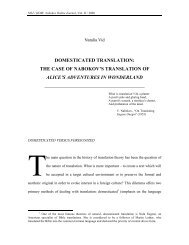Nabokov's Invitation to Plato's Beheading
Nabokov's Invitation to Plato's Beheading
Nabokov's Invitation to Plato's Beheading
- TAGS
- beheading
- etc.dal.ca
You also want an ePaper? Increase the reach of your titles
YUMPU automatically turns print PDFs into web optimized ePapers that Google loves.
NOJ / НОЖ: Nabokov Online Journal, Vol. I / 2007<br />
The case in point is <strong>Invitation</strong> <strong>to</strong> a <strong>Beheading</strong>, a short novel which, in spite of<br />
Nabokov’s avowed disdain for “literature of ideas” and Pla<strong>to</strong>, is laced with Pla<strong>to</strong>nic<br />
references and what Vladimir E. Alexandrov once called “Nabokov’s ‘Neopla<strong>to</strong>nic’<br />
beliefs” (88). It recounts the last days of Cincinnatus C., an extraordinary man sentenced<br />
<strong>to</strong> death for some unmentionable crime that scandalized an entire <strong>to</strong>wn. Confined in a<br />
shadowy prison, Cincinnatus spends his last days in contemplation of a better world and<br />
the afterlife that nonetheless constantly escape his imaginative efforts. Whether the theme<br />
of the novel was influenced by the subject of Pla<strong>to</strong>’s works becomes <strong>to</strong>o tempting <strong>to</strong><br />
ignore. The atmosphere of the novel, for example, immediately evokes Pla<strong>to</strong>’s famous<br />
Allegory of the Cave, a vision of everyday reality as a shadowy realm whose inhabitants<br />
are barely aware of the artificiality of their existence. Only few of them dream of the<br />
other, perfectly original world, let alone actually reach it. Those who do escape, if only in<br />
their imagination, become persecuted upon their return by their fellow cavemen who do<br />
not share their awareness of what is real. 2 Nabokov’s Cincinnatus finds himself in the<br />
same predicament. Cincinnatus’ experiences apparently echo those of Socrates, the<br />
philosopher whose trial, imprisonment and subsequent execution are depicted in Pla<strong>to</strong>’s<br />
in Apology, Cri<strong>to</strong>, and Phaedo, a philosophical interplay of a doomed man’s hopes and<br />
fears. Many other Pla<strong>to</strong>nic references in the novel are equally suggestive. Pierre,<br />
Cincinnatus’ executioner, repeatedly demands sympathy from Cincinnatus, which recalls<br />
Socrates’ sympathy for his own executioner (Phaedo, 117a-b). Cincinnatus’ unexpected<br />
meeting with Cecilia, his mysterious mother who arrives <strong>to</strong> reveal the mysteries of his<br />
birth, corresponds with Socrates’ dream of “a beautiful, graceful woman” who tells him<br />
2 Pla<strong>to</strong>’s Republic, Book VIII (514b-517e).
















